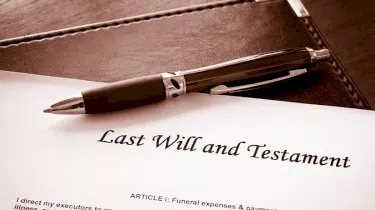Retirement
Executor of will and power of attorney: What’s the difference?
What is the difference between an executor of will and power of attorney? Let’s discuss their roles and why they are both important tools in estate planning.
Executor of will and power of attorney: What’s the difference?
What is the difference between an executor of will and power of attorney? Let’s discuss their roles and why they are both important tools in estate planning.

None of us wants to think about it, but someday we will no longer be in control of our personal and financial affairs. It may be because we are alive but incapacitated, or may be because we have died.
But the reality of it is life goes on after your death. Your assets (real estate, bank accounts, investments etc) still need to be overseen, and your bills, debts and taxes will still need to be paid. When you are no longer capable of managing your affairs, someone will need to have the proper authority to make the crucial decisions for you.
When you are tackling your estate planning, you should go beyond thinking about who gets what. You should also consider who will be in charge of making sure your plans are fulfilled and your wishes are followed. People often use two main legal documents to give a person the authority to act on their behalf: a will and a power of attorney.
Many people mistakenly believe that if they have bestowed someone with the power of attorney, the same person will also act as their executor of will when they die, or vice versa. It’s important to understand that while the roles of executor of will and power of attorney seem interchangeable, these documents work in different time frames and both are necessary to create a comprehensive estate plan.

What is an executor of will?
A will is a legal document that provides instructions on how your estate will be distributed after your death. Upon creating it, you will be required to appoint a person (or an organisation) to administer your estate. This person is known as the executor.
So, what are the responsibilities of an executor? Generally, a nominated executor is responsible for carrying out the instructions and wishes entailed in a will. Their responsibilities include:
- Making funeral arrangements – Before an executor can focus on the main aspects of estate administration, the deceased person must be given a proper send-off with a funeral. In some instances, the deceased will leave specific requests or instructions relating to their funeral. The executor will also check the will and other paperwork to see if the deceased had any insurance or a prepaid plan that will help pay for the funeral. Depending on the situation, an executor must take the necessary steps to ensure that the funeral will proceed without a hitch so that family members and loved ones can have time to grieve.
- Applying for probate – A “grant of probate” from the court is needed before a person has the power to act as an executor of a will. The executor is in charge of managing the estate throughout the probate process and filing the deceased’s will with the proper probate court. Probate ensures that the will is valid and you are given legal permission to carry out your responsibilities as an executor.
- Preserving the assets – One of the most important responsibilities of an executor is to properly maintain assets of the deceased person until it can be properly distributed to beneficiaries. Real estate or other property that belongs to the deceased person must be secured and insured and any cash remaining in the deceased person’s bank account is accumulating interest.
- Convene assets and pay any remaining liabilities – While distributing assets is the main responsibility of an executor, it’s important to first locate all the assets of the person who passed away. Locating the assets involves tracking the important documents, including bank and credit card statements, notices and titles of real estate holdings, mortgage documents, insurance documents and unpaid debt statements. This ensures that all liabilities and expenses have been accounted for.
- Defend the estate from any legal challenges – If someone decides they want to contest the will in court, an executor must intervene and defend the estate as a “legal personal representative”. The two most common legal challenges executors face are family provision applications and caveats over a grant. Family provision applications, also known as “contesting a will” is when a beneficiary wants to receive an extra share of the estate. Meanwhile, when someone claims that the executor named in the will is incompetent for the job or questions the will’s validity, they can put a caveat over the estate. If there is any risk that any of these claims may be made, seek legal advice from an attorney as soon as possible.
- Manage tax affairs – Another important task of an executor is to settle the deceased person’s affairs with the Australian Taxation Office (ATO). This includes notifying ATO of the person’s death. You may need to lodge a final tax return or a trust tax return, depending on the circumstances.
- Distribute assets – After getting all the administrative tasks down, executors must pass the assets to the beneficiaries. Ideally, the will provides a detailed account of who each of their assets will go to. Executors must ensure that every asset is accounted for and properly preserved.
What is a power of attorney?
There’s a popular misconception that a person’s spouse can make financial decisions for them and manage their assets if they are mentally or physically incapacitated. However, unless an official power of attorney has been granted to your partner, the decisions may be up to a government institution instead.
By creating a power of attorney (POA), you can nominate the person you think will make the best decisions to protect your interests. A power of attorney is a legal document you can create that will allow you to name someone to make financial decisions for you when you are unable to do so. Usually, this comes in handy when you fall ill or experienced an accident that made you incapable of making choices for yourself.
The nominated person for POA is known as an agent or your “attorney in fact”. Despite the term, the person does not have to be an attorney or a lawyer to be qualified as an agent. Meanwhile, the person nominating is known as the principal. By creating a POA, you can nominate the person you think will make the best decisions to protect your interests.
As a principal, the powers you can give to your agent can vary depending on state territory and laws. Generally, there are two types of powers of attorney: general and enduring.
General power of attorney
A general power of attorney allows you to appoint someone to make financial and legal decisions for you for a limited or specific period of time. This can be when you are working overseas or you are on a holiday in another country etc. This type of power of attorney does not give your agent the authority to make personal, medical or lifestyle decisions on your behalf.
Additionally, the appointment is rendered invalid if the principal loses the capacity to make their own decisions. This means that the powers granted will be revoked as soon as the principal is officially deemed to be mentally incompetent.
Enduring power of attorney
An enduring power attorney is the most common form used. It gives an agent the power to make financial and legal decisions on your behalf. But unlike a general power of attorney, it comes into effect in a specific direction from the principal or when the principal lacks mental capacity. It also remains in place after loss of capacity, for example, when you are unable to understand and give legal consent to an action or arrangement. Depending on the state or territory, medical authority may or may not be included in an enduring power of attorney. In states that do not give medical authority via this type of POA, a separate permit giving them this power is required.
How do these roles differ?
The main difference between an executor and an agent is when the roles take effect. Power of attorney can come into force in situations in which you are alive but you cannot make decisions independently. Meanwhile, your executor will only take on responsibilities after you have died.
Additionally, the responsibilities for both roles are slightly different, even though both will be involved in managing your affairs when you are unable to do so. An executor has specific and limited job description: making sure your will is carried out and your assets are properly distributed. On one hand, an agent is responsible for a wider range of duties and tasks that can involve ruling on all kinds of decisions such as financial, legal and medical, depending on what aspects you have granted power of attorney over.
Can one person be both an executor and an agent?
It’s not uncommon to choose one person to be both your agent and the executor of your will. Usually, people choose their spouses or their eldest child for the roles. Because of the time difference when these powers come into play, the two roles won’t overlap. However, you should keep in mind that both roles come with big responsibilities. In both cases, you will need to pick the right person whom you trust and believe to be highly competent.

Estate planning
Turning inheritance into impact: The once-in-a-generation opportunity facing Australian families
Australia is on the brink of a seismic shift in wealth distribution, with more than $3.5 trillion expected to be transferred from Baby Boomers to Gen X and Millennials in the next two decades. This ...Read more

Estate planning
Australians encouraged to review their estate plans
Individuals should make sure their current estate plan is up to date. Read more

Estate planning
Why would a person want to set up a trust?
Why would a person want to set up a trust? We list down the reasons that may motivate you to call your attorney today. Read more

Estate planning
Will v trust: Which is best for you?
Should you create a will or a trust? Learn about their differences to know which is the best option for your estate planning. Read more

Estate planning
When is the best time to start estate planning?
One of the biggest misconceptions about estate planning is that you should start developing one only when you’re old. We discuss why you should create one as soon as you can. Read more

Estate planning
Advisers warned on limitations with life expectancy estimates
Jeremy Cooper has highlighted some of the limitations in using average life expectancies when planning retirement income for individual SMSF clients. Read more

Estate planning
Deadly estate planning mistakes and how to overcome them
Estate planning can be a complex process. Here are some of the mistakes you should avoid when getting your affairs in order. Read more

Estate planning
Death benefit rules ‘due for an overhaul’
With the existing legislation around the payment of lump-sum death benefits leading to inadvertent breaches by SMSFs, a technical expert says a more practical approach is needed in this area. Read more

Estate planning
Turning inheritance into impact: The once-in-a-generation opportunity facing Australian families
Australia is on the brink of a seismic shift in wealth distribution, with more than $3.5 trillion expected to be transferred from Baby Boomers to Gen X and Millennials in the next two decades. This ...Read more

Estate planning
Australians encouraged to review their estate plans
Individuals should make sure their current estate plan is up to date. Read more

Estate planning
Why would a person want to set up a trust?
Why would a person want to set up a trust? We list down the reasons that may motivate you to call your attorney today. Read more

Estate planning
Will v trust: Which is best for you?
Should you create a will or a trust? Learn about their differences to know which is the best option for your estate planning. Read more

Estate planning
When is the best time to start estate planning?
One of the biggest misconceptions about estate planning is that you should start developing one only when you’re old. We discuss why you should create one as soon as you can. Read more

Estate planning
Advisers warned on limitations with life expectancy estimates
Jeremy Cooper has highlighted some of the limitations in using average life expectancies when planning retirement income for individual SMSF clients. Read more

Estate planning
Deadly estate planning mistakes and how to overcome them
Estate planning can be a complex process. Here are some of the mistakes you should avoid when getting your affairs in order. Read more

Estate planning
Death benefit rules ‘due for an overhaul’
With the existing legislation around the payment of lump-sum death benefits leading to inadvertent breaches by SMSFs, a technical expert says a more practical approach is needed in this area. Read more










